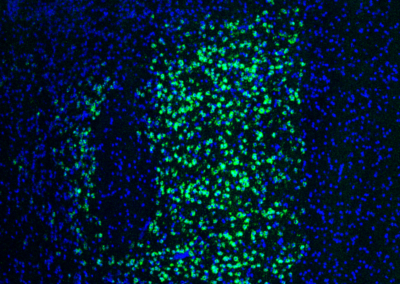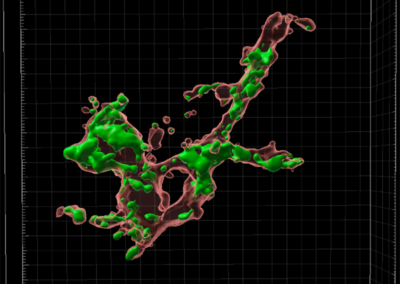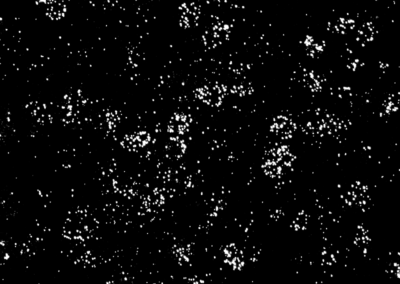RESEARCH
CARROLL PROJECT STEVENS/JOHNSON PROJECT SABATINI PROJECTGRANGER/JOHNSON PROJECT
Complement System Atlas of the Mouse Brain

Project Scientists
Elevated expression of complement component C4A is a major risk factor for schizophrenia. It is known that in rodents, the complement system plays an important role in regulating developmental synapse pruning.
Therefore, it is plausible that over-activation of the complement system could contribute to schizophrenia pathogenesis by causing excessive microglia-dependent synapse elimination. However, what are the molecular changes caused by complement activation that are responsible for triggering excessive synapse engulfment and causing behavioral changes in mice? Are these changes relevant to schizophrenia in humans?
Thalamus Staining
To examine the spatial distribution of complement gene Masp1, the parafascicular region (green) is highlighted amongst the neurons (blue) of the mouse thalamus.
3-D Computer Reconstruction
After pruning the synapse of a neuron, the microglia (red) engulfs the synaptic material (green).
Our hypothesis is that overexpression of human C4A (hC4A) alters the expression of genes involved in glial and neuronal pathways, leading to behavioral changes. To directly test this hypothesis, we plan to construct an atlas for the complement system in the mouse brain using spatial transcriptomics (MERFISH) and determine genes and pathways affected by hC4A overexpression. Similarly, MERFISH is used to map genes and pathways affected in schizophrenia post-mortem tissues. We will test the hypothesis that overexpression of hC4A is causal for the molecular and behavioral changes observed in transgenic mice that overexpress hC4A. Then, we will test the inhibition of hC4A in vivo using either siRNA or a C4-specific blocking nanobody to reverse social behavior phenotypes. Overall, we will identify the gene changes underpinning the effects of hC4A overexpression and determine the feasibility of reversing behavioral phenotypes in a murine preclinical model.


